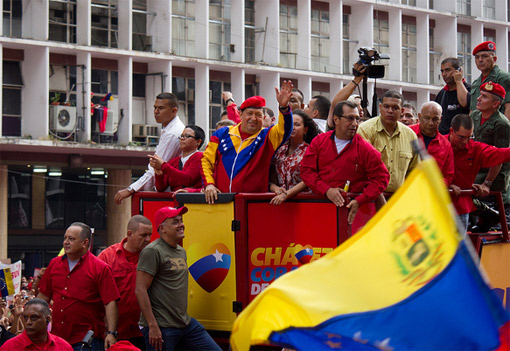Late last week, Venezuelan presidential candidate Henrique Capriles Radonski released a video with his final appeal to voters. Looking straight at the camera, the former governor of Miranda state addressed the fears that prevent some Venezuelans from supporting him fully: being fired from government jobs; being passed over for a social program; or being banned from public-housing waiting lists.
These fears reflect the general state of anxiety Venezuelans face as they head to the polls this Sunday, October 7. Rarely have the words “the most important election in our lifetime” been as true as they are for this contest. The nation faces a choice between the definitive implementation of President Hugo Chávez’ “Twenty-First Century Socialism,” and a path that most would consider a return to mainstream Latin American politics.
Faced with a well-known, charismatic incumbent who enjoys practically limitless campaign funds, this election should—on paper—be a landslide for Chávez. That most polls show it is close, with some even showing Capriles ahead, is a tribute to the challenger’s energy and unerring message discipline, as well as the Chávez administration’s failure to address soaring crime and an endless electricity crisis.
One of the main fears in the minds of Venezuelan voters is the fact that the electoral authority, the Consejo Nacional Electoral (National Electoral Council—CNE), is clearly partial to the government. Voting in Venezuela is machine-based, and voters must unlock the machines by placing their hands on a fingerprint reader, which ensures that they only vote once. Even though the vote itself is separate from the identification portion, and in spite of the opposition’s claims that it has audited the technology thoroughly, there are fears that the secrecy of the vote is not assured.
The opposition leadership, however, insists that the process is tamper-free. They point to the fact that they have won other elections using this technology in the past. They are also working hard to assure its voters that voting centers—particularly those in rural areas that have shown bizarre voting patterns in the past—are all stocked with opposition eyewitnesses.
The opposition is so confident of the integrity of the vote count itself that it has not made an issue of the fact that few monitors will be on the ground. The only prominent team of international observers present on election day will be a team from Unión de Naciones Suramericanas (Union of South American Nations—UNASUR). (The Organization of American States’ request to monitor was denied, and the Carter Center did not ask to send an observer mission.) This recently-formed body is closely aligned with the Venezuela government; indeed, its current secretary-general is Chávez’ former foreign minister. The electoral observer mission from UNASUR, headed by Carlos “Chacho” Álvarez, an ally of Argentine President Cristina Fernández de Kirchner, will be barred from making public comments on the election. They are unlikely to stray from the government’s line anyway, given how they have already endorsed the CNE and its technology.
In spite of the opposition’s reassurance, convincing voters that their vote will be secret and will actually count has proven to be a challenge. A few years ago, millions of voters who signed a petition to recall Chávez were placed in a government list that effectively barred them from working for the government or from companies that did business with it, and even denied them basic government services.
A Quiet Exit?
Another fear in the minds of voters is what will happen if Hugo Chávez were to lose the election. Chávez himself has warned of the dangers of a “civil war” if that were to happen, and his frequent allusions to an armed civilian militia loyal to his Bolivarian revolutionary project makes this a threat to be taken seriously.
It is a sad spectacle when a president warns of a civil war if he does not win an election. Putting that aside, Venezuela is unlikely to slide into a conflict of the scale in Syria or even in neighboring Colombia.
A civil war requires two groups fighting. The opposition does not have armed militias, nor do they control the armed forces. In the event that the poorly-trained chavista militias were to take up arms in the face of a Capriles victory, the armed forces would swiftly stop the violence. If the armed forces were to back up the militias, this would signify nothing short of a coup against a popularly-elected president.
The only danger of prolonged armed conflict is if different bands within the armed forces rise up against each other. However, the Venezuelan military has grown too accustomed to the bourgeois lifestyle of the revolution. It is unlikely they would let go of their perks and luxury goods to take up arms and defend Hugo Chávez.
Ultimately, the best insurance policy Capriles has in the face of these threats is massive turnout of voters and eyewitnesses. A solid win over Chávez would be the most effective safeguard against the threat of violence, and only a significant presence of eyewitnesses will reassure voters that the process was fair. Early reports suggest opposition witnesses will be present in all voting centers, as its leaders have claimed.
Capriles has asked his supporters to turn out this Sunday, saying in his final appeal: “Vote for me, but do it for you, because it is the right thing to do.” When you go to vote, he says, do it for your kids, against those who threaten you, and do not be afraid.
His hope is that this simple message of empowerment and courage will be enough to overcome the uncertainties that lie ahead. Ultimately, it will take an act of collective bravery to topple Hugo Chávez at the ballot box.








